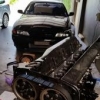Swapped Turbo, Still Having Problems.
Announcements
-
Similar Content
-
Latest Posts
-
By Dose Pipe Sutututu · Posted
LOL.... a good amount of people (not all) on that continent seem to know everything and like to measure things in bananas, football fields, statue of liberties instead of the metric system lol. -
By dawhitehonky · Posted
I assume the modules are similar enough, so if you've had no issues I don't see why I would. I have tried to find a wiring diagram for the FPCM / fuel pump circuit, but I can't find it anywhere. Otherwise, I would just do some wire cutting and joining at the FPCM and give the 12 V supplied to the FPCM directly to the pump instead. If you know anyone that could help with wiring diagrams, I'd be very happy -
If it dies, then bypass. The task isn't difficult. I have one running on a standard R32 FPCM. That's after nearly 20 years of it running an 040, which pull substantially more current than the Walbro. They're not the same module, but I'd hope it indicates that the R33 one should be man enough for the job. I think people kill them when putting proper sized pumps on them, not these little toy pumps we're talking about here.
-
Silicone spray won't hurt anything. And if it does, that's an opportunity to put some solid steel spherical bushings in, so you can really learn what suspension noise sounds like, If you're going to try it, just spray one bush at a time, so you can work out which one is actually noisy. My best guess is that if the noise started only since putting the coilovers in, then it is just noise being transmitted up through the top mounts of the struts, and not necessarily "new" noise from bushes. But it's almost impossible to know.
-
Are you saying the 34 is SUV height, and not that we're talking about an SUV here? (because if we're talking about an SUV, you don't fix them. You just replace them when something breaks. Not worth establishing sufficient emotional connection with an SUV to warrant doing any work on one). I wouldn't jack my car up on a short little loop of 10mm steel rod poking out through a hole in the bumper bar, front or rear end. I realise that we're probably not talking about that type of loop at the front, being the one under/behind the bar on a Skyline.... but even for that one, trying to jack up on what amounts to a thin piece of steel, designed purely for withstanding a horizontal tension force, not a vertical compressive force (and so would be prone to buckling/crushing) and, my most particular bitch about it - located RIGHT AT THE EXTREME FRONT OF THE CAR, applying a load up through the radiator support panel, etc, with almost the entire mass of the car cantilevered between there and the rear wheels? Nope. Not doing that. Not on the regular. That structure out there in front of the front crossmember is not designed to carry load in the vertical direction. Not really designed to carry any load at all, really. The chassis rail that the tow point is connected to would be fine loaded in tension, as per towing. Not intended to carry the mass of the whole car, especially loaded all on one rail, with twisting and all sorts of shitty load distribution going on. No, I will happily drive up on some pieces of wood, thanks. That can only happen on driven wheels, and they are at the other end of the car, and this problem does not exist at that end of the car. And even then, I have been known to drive up on at least 1x piece of 2x8 each side at the rear, simply to reduce the amount of jack pumping necessary to get the car up high enough for the jack stands. What really really shits me about Skylines is the lack of decent places for chassis stands at either end of the car. You'd think they'd be designed into the crossmembers.
-





.thumb.jpg.1b7f9b555236b5ea56c3fed20c733de8.jpg)
Recommended Posts
Create an account or sign in to comment
You need to be a member in order to leave a comment
Create an account
Sign up for a new account in our community. It's easy!
Register a new accountSign in
Already have an account? Sign in here.
Sign In Now